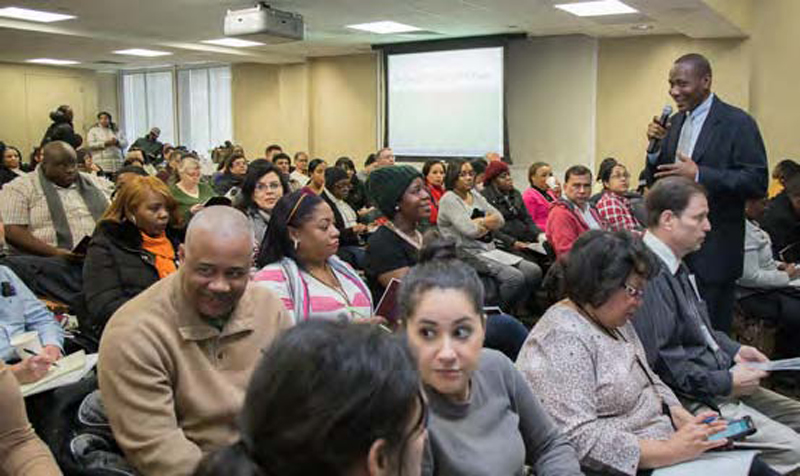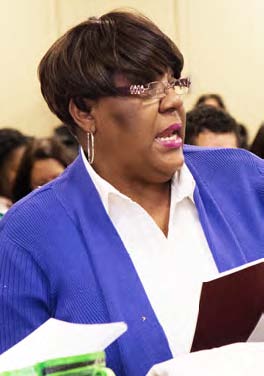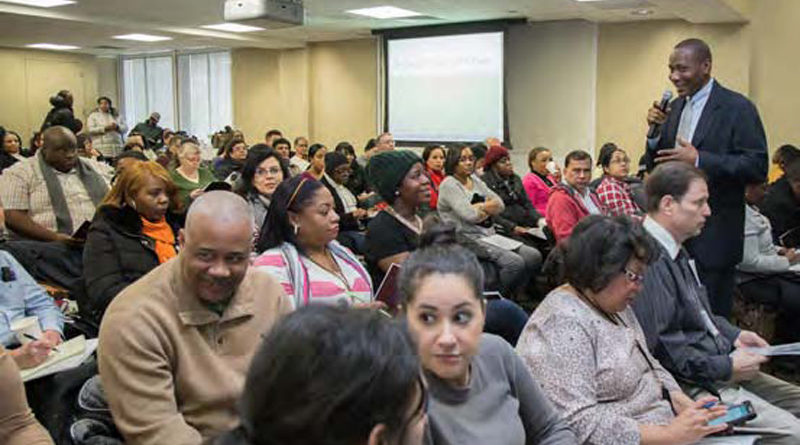Rent Collection Training Provides Staff with New Tools and Insights

The first two weeks of the new year began with training for property managers, assistant property managers and housing assistants across NYCHA for one of the most important and sometimes sensitive jobs—collecting the rent. NYCHA’s Rent Collection Initiative is a key part of NextGeneration NYCHA, as rent and related fees provide about one third of the Authority’s operating budget. NextGen NYCHA calls for increasing revenue through rent collection by $10 million annually.
“How we measure the rent collection rate for each development has been simplified, effective January 1, so that the result of the Rent Collection Initiative can be properly assessed,” said Accounting and Fiscal Services Department Deputy Director Adham Choucri, who explained new metrics and reports at the start of the training session held on January 12. Each development will be assigned a target rent collection rate, based on its prior performance.
Operations managers and supervisors are learning more about the new reports and expectations for accountability at monthly borough meetings, which the Queens/Staten Island Property Management Departments has already completed.
“Rent Demand”
Rent collection begins with asking for it! But like all steps in the rent collection process, there are carefully prescribed methods and procedures, with forms to record each step in the process. The “rent demand” may be made in person, by phone, or in writing, explained Sam Mordi, NYCHA’s Deputy General Counsel, who conducted the training. “You have to show tenants respect and then they will respect you. It goes both ways,” he noted.
However, if rent is not paid by the 15th day of the month, and the resident owes two or more months’ rent, a Petition and Notice of Petition must be legally served. If a proper rent demand cannot be demonstrated by documentary evidence, Mr. Mordi warned, any case for nonpayment that NYCHA may bring to Housing Court could be dismissed.
Rental Assistance Referrals
Although eviction for unpaid rent is an outcome that NYCHA and the City want to avoid, the training included detailed information regarding Housing Court proceedings also contained in a new manual recently compiled by the Law Department and distributed at the training sessions. Training also included important information on rent assistance referrals and emergency assistance grants that can help families in arrears.

NYCHA has entered into an agreement with the Human Resources Administration (HRA) to provide emergency assistance grants to residents facing eviction for non-payment of rent or chronic rent delinquency. To facilitate this process, NYCHA is now placing a 35-day hold on evictions for these cases.
Property management staff also learned about community- based organizations that provide residents with financial counseling, financial literacy workshops and other means for financial self-sufficiency. Most residents pay their rent on time and when they are delinquent on rent they are usually faced with other, more complex issues causing loss of income.
“Operations staff have a wealth of knowledge to share,” Mr. Mordi later said. “They are always willing to learn new tools and procedures that will assist them in collecting the rent. The comprehensive Housing Court Proceedings Manual developed by the Law Department with assistance from Operations and other departments represents a major effort that will provide another valuable resource.”
Housing Assistant Denise Parker at Jefferson Houses in Manhattan said, “even though I have been with NYCHA for 29 years, I gained more knowledge about how to handle certain cases in Housing Court and I was also glad to learn that we can contact our Law Department for assistance.”
“It’s good that the training emphasized new ways to help tenants,” said Assistant Property Manager Dorcas Perdue at Carey Gardens in Brooklyn, “like contacting the Social Services Department in HRA or community agencies. We never want to see families lose their homes for not paying rent.”







